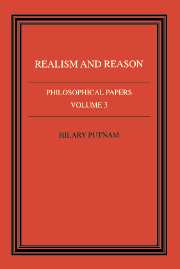Book contents
- Frontmatter
- Contents
- Dedication
- Introduction
- 1 Models and reality
- 2 Equivalence
- 3 Possibility and necessity
- 4 Reference and truth
- 5 ‘Two dogmas’ revisited
- 6 There is at least one a priori truth
- 7 Analyticity and apriority: beyond Wittgenstein and Quine
- 8 Computational psychology and interpretation theory
- 9 Reflections on Goodman's Ways of Worldmaking
- 10 Convention: a theme in philosophy
- 11 Philosophers and human understanding
- 12 Why there isn't a ready-made world
- 13 Why reason can't be naturalized
- 14 Quantum mechanics and the observer
- 15 Vagueness and alternative logic
- 16 Beyond historicism
- Bibliography
- Acknowledgements
- Index
16 - Beyond historicism
Published online by Cambridge University Press: 06 January 2010
- Frontmatter
- Contents
- Dedication
- Introduction
- 1 Models and reality
- 2 Equivalence
- 3 Possibility and necessity
- 4 Reference and truth
- 5 ‘Two dogmas’ revisited
- 6 There is at least one a priori truth
- 7 Analyticity and apriority: beyond Wittgenstein and Quine
- 8 Computational psychology and interpretation theory
- 9 Reflections on Goodman's Ways of Worldmaking
- 10 Convention: a theme in philosophy
- 11 Philosophers and human understanding
- 12 Why there isn't a ready-made world
- 13 Why reason can't be naturalized
- 14 Quantum mechanics and the observer
- 15 Vagueness and alternative logic
- 16 Beyond historicism
- Bibliography
- Acknowledgements
- Index
Summary
Hegel contributed two great and formative ideas to our culture, ideas between which there is some tension. On the one hand, he taught us to see all our ideas, including above all our ideas of rationality, our images of knowledge, as historically conditioned. After Hegel it was, for example, no longer possible to see Descartes' solipsistic methodology as a pure idea, a thought anyone might have had at any time (even if that is the way we still teach Descartes); the connections between individualism in methodology and the replacement of the whole hierarchical world view of the middle ages by the individualistic and competitive world view of early capitalism have been a subject for reflection ever since Hegel (not just since Marx). On the other hand, Hegel postulated an objective notion of rationality which we (or Absolute Mind) were coming to possess with the fulfillment of the progressive social and intellectual reforms which were already taking place. In the subsequent decades many accepted this idea of a new, a modernist, conception of rationality, while refusing to identify it with Hegel's system. Hegel's system has, indeed, been regarded as something preposterous. But the positivist conception of scientific rationality as the specifically modern product which is fated to replace older notions once and for all (and to replace the sequence of ‘determinate negations’ with a steady progressive evolution, an eternal self-improvement of ‘the scientific method’) owes much to the Hegelian conception.
- Type
- Chapter
- Information
- Philosophical Papers , pp. 287 - 303Publisher: Cambridge University PressPrint publication year: 1983
- 4
- Cited by



